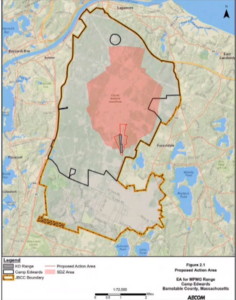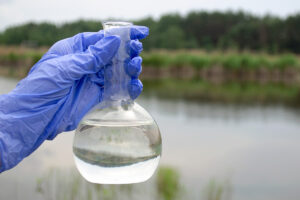
Potential location for the Joint Base machine gun range. Barnstable County.
Update May 11, 2023: This story has been updated with an official statement from Barnstable County officials below.
JOINT BASE CAPE COD – Barnstable County officials are supporting the draft determination from the U.S. Environmental Protection Agency (EPA) that would deny federal funding to a proposed machine gun range for Joint Base Cape Cod.
The EPA report indicates the project could be a hazard to public health, as it could contaminate the region’s sole source aquifer.
“Groundwater in the area of Joint Base Cape Cod provides approximately 3 million gallons of drinking water per day to 12 Community public water supply systems in the towns of Sandwich, Bourne, Falmouth, Mashpee and also the Mashpee Wampanoag Tribe,” said Bethany Traverse, Health Communications Coordinator for the county.
While army officials said the range would only utilize copper bullets, chemicals from propellant and other components can add up over years and lead to contamination and health impacts, according to county officials.
“Because of our glacial origins, our soils are composed of highly permeable materials—sand and gravel—which makes the aquifer very susceptible to contamination,” said Traverse.
Army officials at the base previously stated that a range on-site would cut down on transportation costs to off–Cape facilities for required machine gun training.
The EPA is accepting comments on the proposed draft for 60 days, with a public hearing scheduled for May 24 at 7 pm at the Sandwich Center for Active Living.
“Cape Cod’s Sole Source Aquifer is a public health resource that must be protected,” said EPA Regional Administrator David W. Cash in the EPA report disclosed late last month.
“We have studied the proposed machine gun range very carefully because EPA recognizes the need for our armed forces to maintain readiness and provide training to service members. However, the risk of irreparable damage to the only drinking water source on Cape Cod is too significant.”
The following is the full statement from Barnstable County:
Yesterday at the County Commissioners’ regular meeting, the Department of Health and Environment concurred with the U.S. Environmental Protection Agency’s draft decision to prohibit the Army National Guard’s proposed Machine Gun Range in the Upper Cape Water Supply Reserve.
“The draft decision comes after extensive research, analysis, and assessment of the potential impacts on Cape Cod’s aquifer, surrounding communities, and public health. The Department of Health and Environment agrees with the EPA’s analysis and recommendations in their Draft Report” said Sean O’Brien, Director of the Department.
Health and Environment Director O’Brien, along with Bethany Traverse, Health Communications Coordinator, provided the Barnstable County Commissioners with an in-depth overview of the EPA draft report. The proposed range sits atop the Sagamore Lens which is the largest of the six lenses that make up Cape Cod’s sole source aquifer, which is protected under the Safe Drinking Water Act of 1974. The range is also within the boundaries of the Upper Cape Water Supply Reserve, a 15,000-acre conservation area established by the Commonwealth in 2002 to protect its ecologically significant wildlife and the largest source of drinking water for Cape Cod.
The groundwater from the Sagamore Lens provides approximately 3 million gallons of drinking water per day to community public water supply systems in the towns of Sandwich, Bourne, Falmouth, Mashpee, Yarmouth, Barnstable and the Mashpee Wampanoag Tribe.
The EPA draft report found that “groundwater contamination at the proposed machine gun range would pose a significant public health risk” based on the volume of potential contaminants that would be released to the environment via firing propellants and residues, as well as degrading bullets, casings, and fragments deposited on and in the soil.
The EPA estimated that approximately 1.3 million bullets would be fired at the site annually, ultimately resulting in more than 275 tons of bullet components released to the environment over a 50-year timeframe.
To view the presentation by Barnstable County’s Department of Health and Environment, please visit https://www.capecod.gov/
MPMPRG
More stories from CapeCod.com:
 National Guard Seeking Bids for Proposed Gun Range July 24, 2024
National Guard Seeking Bids for Proposed Gun Range July 24, 2024 Warren Pumps Brakes on Joint Base Gun Range Funding June 19, 2024
Warren Pumps Brakes on Joint Base Gun Range Funding June 19, 2024 Federal Funding Not Approved for Machine Gun Range on Cape December 26, 2023
Federal Funding Not Approved for Machine Gun Range on Cape December 26, 2023























